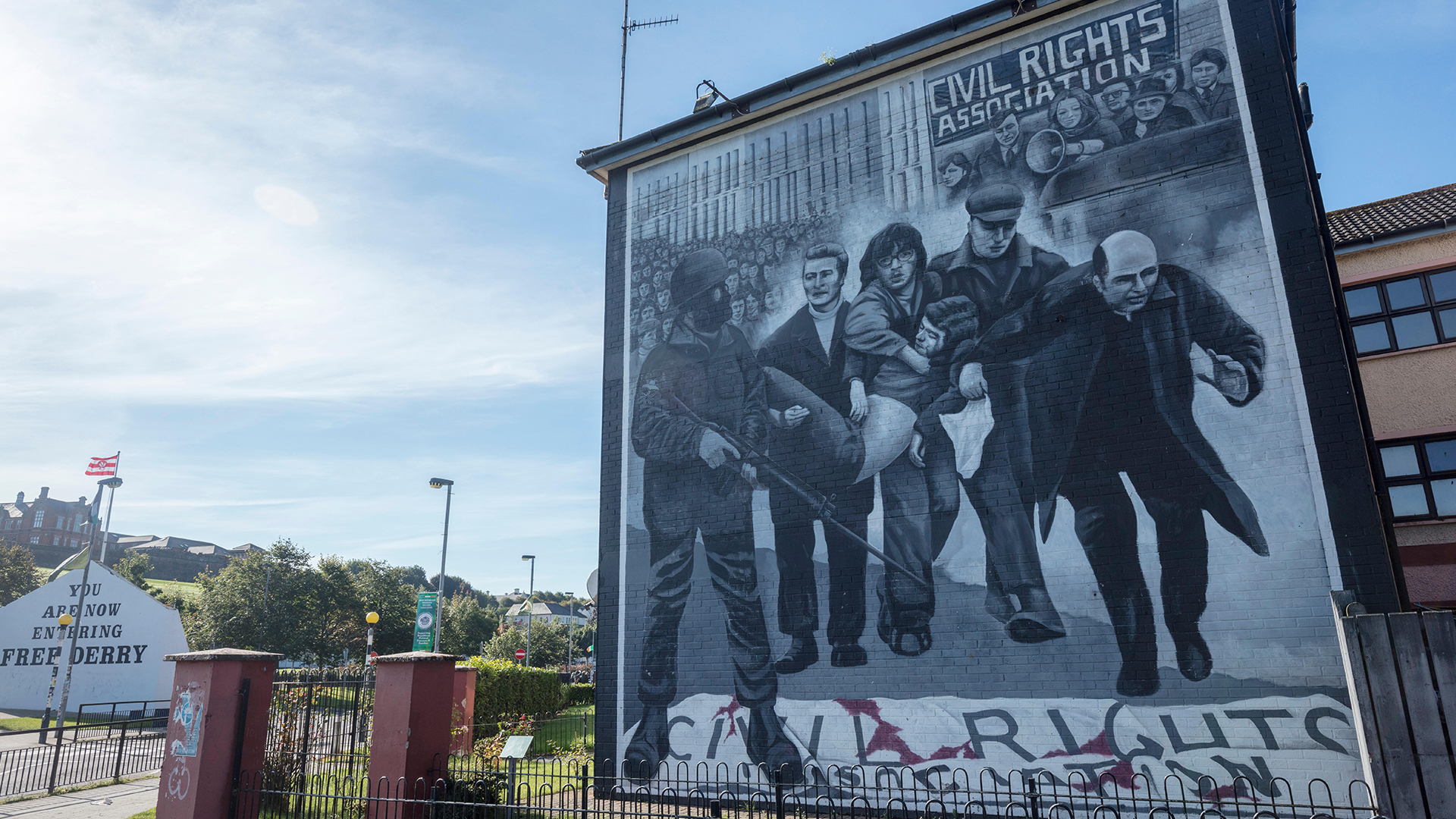
Soldier F found not guilty of murder and attempted murder on Bloody Sunday

A former paratrooper known as Soldier F has been found not guilty at Belfast Crown Court of committing two murders and five attempted murders on Bloody Sunday in Londonderry in 1972.
Veterans' groups welcomed the acquittal and said "soldiers across the UK will be heartened by this".
Judge Patrick Lynch said the evidence provided by the Crown fell "well short" of what was needed for a conviction.
He added that the soldiers involved on the day had lost all sense of military discipline and had "sullied" the reputation of the regiment by shooting unarmed civilians fleeing from them in the back.
"Shooting in the back unarmed civilians fleeing from them on the streets of a British city. Those responsible should hang their heads in shame," he said.
The case for the prosecution relied on hearsay evidence from two fellow soldiers who gave a number of conflicting statements to the Royal Military Police and subsequent inquiries into the events of Bloody Sunday.
Soldier G has since died, and Soldier H declined to appear in court, citing the risk of self-incrimination – Judge Lynch dismissed both witnesses as unreliable and said their statements were contradictory and untrue in places.
Thirteen people were killed when members of the Parachute Regiment opened fire on a civil rights demonstration in the city.
Soldier F, who cannot be identified due to a court order, was accused of the murders of James Wray and William McKinney.
He was also charged with the attempted murders of Michael Quinn, Patrick O'Donnell, Joseph Friel, Joe Mahon and an unknown person.
Soldier F had pleaded not guilty to all charges.
The judge said members of the Parachute Regiment opened fire on a group of unarmed civilians using high-velocity weapons at a distance of no more than 50 metres.
Civilians shot in the back
He said Soldiers G, F, H and E were part of that group and had lost military discipline.
"Shooting in the back unarmed civilians fleeing from them on the streets of a British city. Those responsible should hang their heads in shame," he said.
The judge reminded the court there was no concept of collective guilt – only individual responsibility.
He also said the evidence presented by the Crown in the case against Soldier F fell well short of the standard required by the court for conviction – and he therefore found the accused not guilty on all seven counts.
Soldier F was present at Belfast Crown Court for each day of the non-jury trial with his identity concealed behind a curtain in the courtroom.
Relatives of the men killed and supporters also attended each day of the trial.
"No rewriting the past"
DUP leader Gavin Robinson said the judgement represented a clear outcome for a legal process which had "reopened many painful memories".
"The vast majority of those who served in our Armed Forces did so with honour and often at great personal cost. There must be no rewriting of the past and we will continue to guard against all attempts to do so."
Paul Young, national spokesman for the Northern Ireland Veterans Movement, said veterans would be "heartened by this verdict today".
"Soldiers across the United Kingdom will be happy with this, and I hope that there is no more soldiers brought to the courts here with evidence that has actually no way of going through."
The judgement is likely to mark an end to legislation in the case.
Northern Ireland's First Minister Michelle O'Neill has said she will continue to support the Bloody Sunday families in the "pursuit of justice".
In a social media post, she said: "Fifty-three years ago, the British Army indiscriminately murdered civilians on the streets of Derry.
"Over 15 years ago, the then British Prime Minister publicly acknowledged the role of British soldiers on Bloody Sunday.
"Yet, not one British soldier or their military and political superiors has ever been held to account. That is an affront to justice."
A way forward
A Government spokesperson said after the verdicts were delivered: "We note today's judgement. The MOD has provided legal and welfare support throughout, as it does for any veteran involved in a legal process arising from their duties.
"This case is part of the complex legacy of The Troubles, which affected so many families and communities.
"We are committed to finding a way forward that acknowledges the past, whilst supporting those who served their country during an incredibly difficult period in Northern Ireland's history."
We will always back our veterans, insists Pollard
Defence Minister Luke Pollard told BFBS Forces News: "We want to draw a line under the legacy situation that many of our veterans have found themselves in Northern Ireland.
"We're repealing and replacing the Northern Ireland Legacy Act, which frankly does not work, and was found to be unlawful.
"And the additional support that we're offering to veterans that was announced recently, I think this verdict only shows that to be even more necessary.
"We will always back our veterans. We will find a way of renewing that legislation so it works properly, that not only provides support for veterans, but also means for those forces' families who had their loved ones killed during The Troubles, there's still a chance of getting justice for them.
"Taken together, there's more work to be done. But I'm pleased that the steps we're taking will support our veterans."









